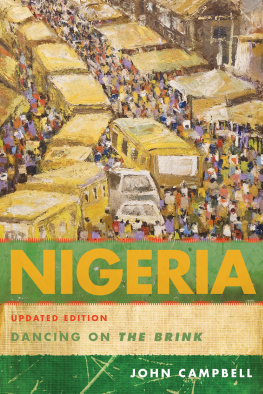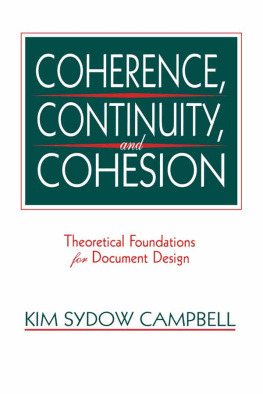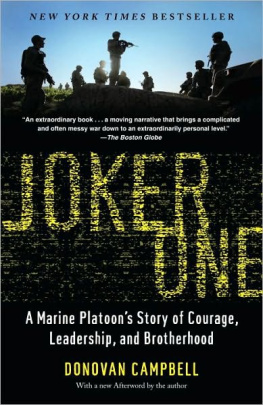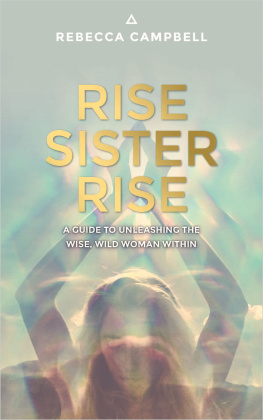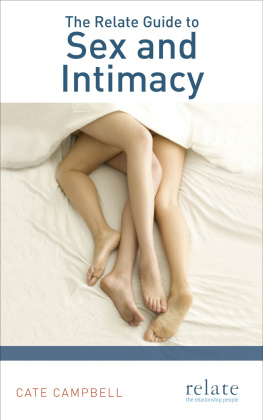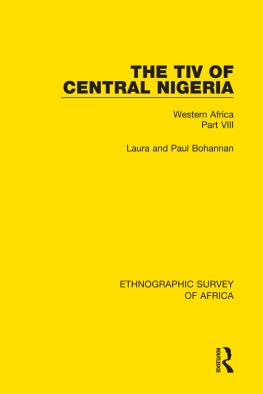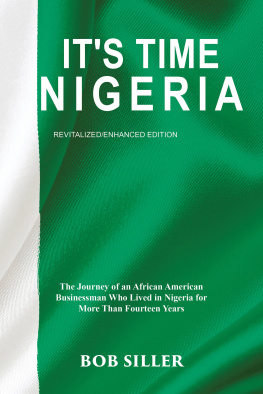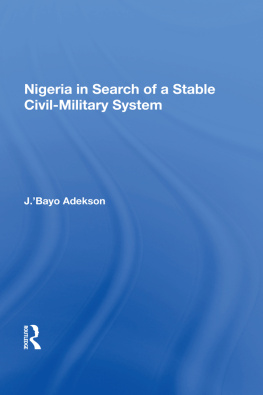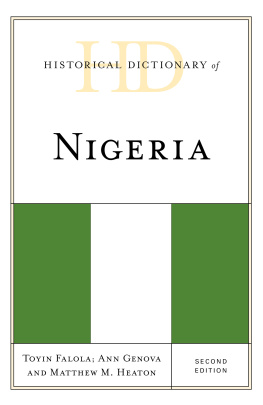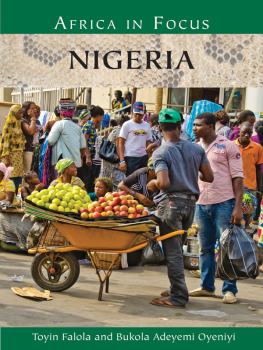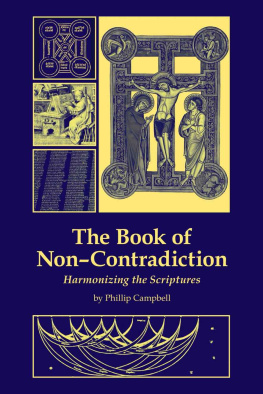Campbell - Nigeria: dancing on the brink
Here you can read online Campbell - Nigeria: dancing on the brink full text of the book (entire story) in english for free. Download pdf and epub, get meaning, cover and reviews about this ebook. City: Lanham;Nigeria, year: 2013;2012, publisher: Rowman & Littlefield Publishing Group, Inc.;Rowman & Littlefield Publishers, genre: Politics. Description of the work, (preface) as well as reviews are available. Best literature library LitArk.com created for fans of good reading and offers a wide selection of genres:
Romance novel
Science fiction
Adventure
Detective
Science
History
Home and family
Prose
Art
Politics
Computer
Non-fiction
Religion
Business
Children
Humor
Choose a favorite category and find really read worthwhile books. Enjoy immersion in the world of imagination, feel the emotions of the characters or learn something new for yourself, make an fascinating discovery.
Nigeria: dancing on the brink: summary, description and annotation
We offer to read an annotation, description, summary or preface (depends on what the author of the book "Nigeria: dancing on the brink" wrote himself). If you haven't found the necessary information about the book — write in the comments, we will try to find it.
Nigeria: dancing on the brink — read online for free the complete book (whole text) full work
Below is the text of the book, divided by pages. System saving the place of the last page read, allows you to conveniently read the book "Nigeria: dancing on the brink" online for free, without having to search again every time where you left off. Put a bookmark, and you can go to the page where you finished reading at any time.
Font size:
Interval:
Bookmark:
Nigeria
Nigeria
Dancing on the Brink
Updated Edition
John Campbell
A COUNCIL ON FOREIGN RELATIONS BOOK
ROWMAN & LITTLEFIELD PUBLISHERS, INC.
Lanham Boulder New York Toronto Plymouth, UK
The Council on Foreign Relations (CFR) is an independent, nonpartisan membership organization, think tank, and publisher dedicated to being a resource for its members, government officials, business executives, journalists, educators and students, civic and religious leaders, and other interested citizens in order to help them better understand the world and the foreign policy choices facing the United States and other countries. Founded in 1921, CFR carries out its mission by maintaining a diverse membership, with special programs to promote interest and develop expertise in the next generation of foreign policy leaders; convening meetings at its headquarters in New York and in Washington, DC, and other cities where senior government officials, members of Congress, global leaders, and prominent thinkers come together with CFR members to discuss and debate major international issues; supporting a Studies Program that fosters independent research, enabling CFR scholars to produce articles, reports, and books and hold roundtables that analyze foreign policy issues and make concrete policy recommendations; publishing Foreign Affairs, the preeminent journal on international affairs and U.S. foreign policy; sponsoring Independent Task Forces that produce reports with both findings and policy prescriptions on the most important foreign policy topics; and providing up-to-date information and analysis about world events and American foreign policy on its website, www.cfr.org.
THE COUNCIL ON FOREIGN RELATIONS TAKES NO INSTITUTIONAL POSITION ON POLICY ISSUES AND HAS NO AFFILIATION WITH THE U.S. GOVERNMENT. ALL STATEMENTS OF FACT AND EXPRESSIONS OF OPINION CONTAINED IN ITS PUBLICATIONS ARE THE SOLE RESPONSIBILITY OF THE AUTHOR OR AUTHORS.
Published by Rowman & Littlefield Publishers, Inc.
A wholly owned subsidiary of The Rowman & Littlefield Publishing Group, Inc.
4501 Forbes Boulevard, Suite 200, Lanham, Maryland 20706
www.rowman.com
10 Thornbury Road, Plymouth PL6 7PP, United Kingdom
Copyright 2013 by Rowman & Littlefield Publishers, Inc.
The map of Nigeria is courtesy of the UN Cartographic Section (Nigeria, no. 4228 October 2004). It is reprinted here with permission.
All rights reserved. No part of this book may be reproduced in any form or by any electronic or mechanical means, including information storage and retrieval systems, without written permission from the publisher, except by a reviewer who may quote passages in a review.
British Library Cataloguing in Publication Information Available
Library of Congress Cataloging-in-Publication Data
Campbell, John, 1944
Nigeria : dancing on the brink / John Campbell.
p. cm.
A Council on Foreign Relations book.
Includes bibliographical references and index.
ISBN 978-1-4422-2156-7 (cloth : alk. paper) ISBN 978-1-4422-2157-4 (pbk. : alk. paper) ISBN 978-1-4422-2158-1 (electronic) 1. NigeriaPolitics and government2007 2. NigeriaEconomic conditions1970 3. Social conflictNigeria. 4. Ethnic conflictNigeria. I. Title.
JQ3090.C36 2013
966.9054dc23
2013008131
 TM The paper used in this publication meets the minimum requirements of American National Standard for Information Sciences Permanence of Paper for Printed Library Materials, ANSI/NISO Z39.48-1992.
TM The paper used in this publication meets the minimum requirements of American National Standard for Information Sciences Permanence of Paper for Printed Library Materials, ANSI/NISO Z39.48-1992.
Printed in the United States of America
Nigeria, home to about 20 percent of the people living in Africa south of the Sahara, has a population about the size of the Russian Federations. The United States is increasingly dependent on it for imported oil and natural gas, though that could change as its own oil and gas production increases with the new oil shale technologies. Nigerias government contributes large numbers of troops to United Nations and other peacekeeping operations, and it has lobbied vigorously for a permanent seat on the UN Security Council. A regional leader, Nigeria is one of the founders of the African Union and is the linchpin of the Economic Community of West African States.
With its large population, natural resource endowment, and tradition of international engagement, Nigeria was perhaps the most important African strategic partner of George W. Bushs administration. But Nigeria at present faces challenges that put its partnership with the United States at risk, and Nigerias international role has declined under presidents Umaru YarAdua and Goodluck Jonathan.
In the Niger Delta, the heartland of Nigerias natural resource wealth, an insurgency against the federal government continues despite an amnesty now more than two years old. In the North, currents of radical Islam have taken hold, and bloody uprisings against government authorities are increasing in frequency. Ostensibly a democracy since the end of military dictatorship in 1998, executive authority in Abuja was paralyzed by the illness and subsequent death of the president, Umaru YarAdua, in May 2010.
President Jonathan successfully ran for election in 2011, thereby ending the informal arrangement under which the presidency alternated between candidates from the South and the North, exacerbating the latters alienation from the Abuja government and encouraging the rise of radical Islam. Growing numbers of Nigerians, not just in the North, are alienated from their government and believe their nation is failing as a state.
For a country of such importance, Nigeria is little known in the United States. Only one book intended for the nonspecialist reader has appeared in English in the past decade, Karl Maiers This House Has Fallen: Nigeria in Crisis (2002). Few Americans visit. Internal travel is difficult with the deterioration of Nigerias infrastructure and escalating violence. My hope is that Nigeria: Dancing on the Brink will introduce the nonspecialist reader to the complexity and challenges of contemporary Nigeria and foster an appreciation for those Nigerians working against state failure in Africas most important country.
Despite the regular abrogation of the rule of law, the high levels of violence, and official corruption and incompetence, Nigerians regard themselves as fundamentally free, and they have never been afraid to express their opinions, even during the years of military dictatorship. And they like to talk to foreign diplomats. Much of this book is based on conversations and personal experiences I had during my thirty months (February 1988 through July 1990) as political counselor based in Lagos and my thirty-eight months as ambassador (May 2004 through July 2007) in Abuja. This second edition addresses Nigerian developments since the death of President YarAdua.
In Nigeria: Dancing on the Brink, I argue that U.S. policy makers should pay greater attention to Nigerias internal developments, which affect its ability to partner with the United States. With its other preoccupations, the United States can play only a marginal role in Nigeria. At the time the first edition appeared, there were hopeful developments. Alas, Nigeria faces even greater challenges now, and this edition has two new chapters, one on political developments and the other on the grassroots radical Islamic insurgency in the North called Boko Haram. I close the book with modest policy recommendations as to what the Obama administration might do to support Nigerians working for democracy and the rule of law.
I knew nothing firsthand about Africa until the U.S. Foreign Service quixotically transferred me from Geneva to Lagos in 1988. My sole African experience had been a stop at the Dakar airport during a flight from London to Buenos Aires. Once I arrived in Nigeria, however, Ambassador Princeton N. Lyman patiently introduced me to Africas fascinating complexities. Ever since, he has been a source of encouragement and wisdom.
Next pageFont size:
Interval:
Bookmark:
Similar books «Nigeria: dancing on the brink»
Look at similar books to Nigeria: dancing on the brink. We have selected literature similar in name and meaning in the hope of providing readers with more options to find new, interesting, not yet read works.
Discussion, reviews of the book Nigeria: dancing on the brink and just readers' own opinions. Leave your comments, write what you think about the work, its meaning or the main characters. Specify what exactly you liked and what you didn't like, and why you think so.

